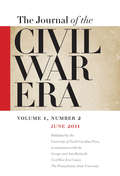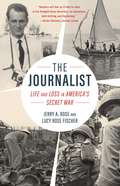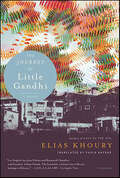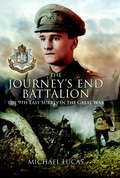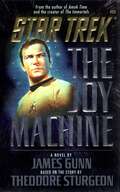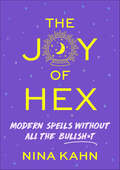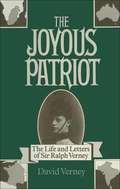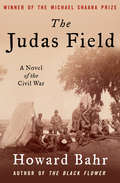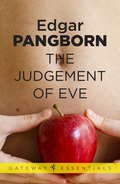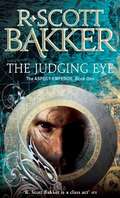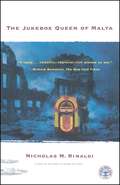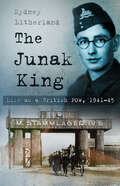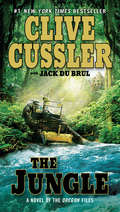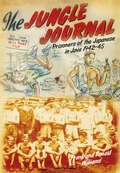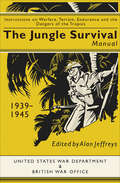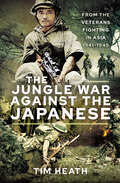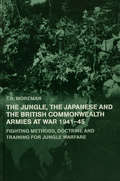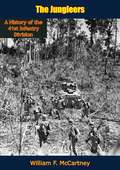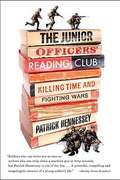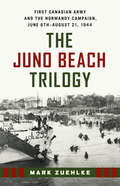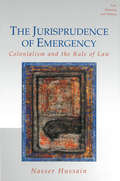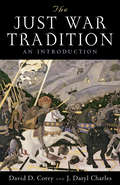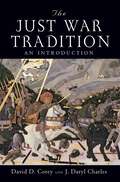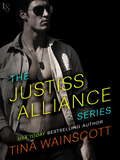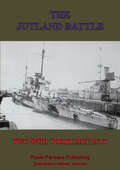- Table View
- List View
The Journal of the Civil War Era, Volume 1, #2, (Summer #2011)
by William A. BlairThe University Of North Carolina Press And The George And Ann Richards Civil War Era Center At The Pennsylvania State University Are Pleased To Publish The Journal Of The Civil War Era. William Blair, Of The Pennsylvania State University, Serves As Founding Editor.<P><P> Table Of Contents For This Issue, Volume One, Number Two:<P> Volume 1, Number 2 June 2011<P> Table Of Contents<P> Articles<P><P> A. Kristen Foster<P> "We Are Men!": Frederick Douglass And The Fault Lines Of Gendered Citizenship<P><P> Kathryn S. Meier<P> "No Place For The Sick": Nature's War On Civil War Soldier: Mental And Physical Health In The 1862 Peninsula And Shenandoah Valley Campaigns<P><P> Brandi C. Brimmer<P> "Her Claim For Pension Is Lawful And Just": Representing Black Union Widows In Late-Nineteenth Century North Carolina<P><P> Review Essay<P> Frank Towers<P> Partisans, New History, And Modernization: The Historiography Of The Civil War's Causes, 1861-2011<P><P> Book Reviews<P> Books Received<P> Professional Notes<P> Daniel E. Sutherland<P> The Seven O'Clock Lecture<P><P> Notes On Contributors<P> The Journal Of The Civil War Era Takes Advantage Of The Flowering Of Research On The Many Issues Raised By The Sectional Crisis, War, Reconstruction, And Memory Of The Conflict, While Bringing Fresh Understanding To The Struggles That Defined The Period, And By Extension, The Course Of American History In The Nineteenth Century.
The Journalist: Life and Loss in America's Secret War
by Jerry A. Rose Lucy Rose FischerJerry Rose, a young journalist and photographer in Vietnam, exposed the secret beginnings of America&’s Vietnam War in the early 1960s. Putting his life in danger, he interviewed Vietnamese villagers in a countryside riddled by a war of terror and intimidation and embedded himself with soldiers on the ground, experiences that he distilled into the first major article to be written about American troops fighting in Vietnam. His writing was acclaimed as &“war reporting that ranks with the best of Ernest Hemingway and Ernie Pyle,&” and in the years to follow, Time, The New York Times, The Reporter, New Republic, and The Saturday Evening Post regularly published his stories and photographs. In spring 1965, Jerry&’s friend and former doctor, Phan Huy Quat, became the new Prime Minister of Vietnam, and he invited Jerry to become an advisor to his government. Jerry agreed, hoping to use his deep knowledge of the country to help Vietnam. In September 1965, while on a trip to investigate corruption in the provinces of Vietnam, he died in a plane crash in Vietnam, leaving behind a treasure trove of journals, letters, stories, and a partially completed novel. The Journalist is the result of his sister, Lucy Rose Fischer, taking those writings and crafting a memoir in &“collaboration&” with her late brother—giving the term &“ghostwritten&” a whole new meaning.
The Journey of Little Gandhi: A Novel
by Elias Khoury"Los Angeles has Joan Didion and Raymond Chandler, and Istanbul, Orhan Pamuk. The beautiful, resilient city of Beirut belongs to Khoury."--Laila Lalami, Los Angeles TimesFrom the author of Gate of the Sun and "one of the most innovative novelists in the Arab World" (The Washington Post Book World) comes the many-layered story of Little Gandhi, or Abd Al-Karim, a shoe shine in a city fractured by war. Shot down in the street, Gandhi's story is recounted by an aging and garrulous prostitute named Alice. Ingeniously embedding stories within stories, Little Gandhi becomes the story of a city, Beirut, in the grip of civil war. Once again, as John Leonard wrote in Harper's Magazine, Elias Khoury "fills in the blank spaces on the Middle Eastern map in our Western heads."
The Journeys End Battalion: The 9th East Surrey in the Great War
by Michael LucasR.C. Sherriff, author of Journeys End, the most famous play of the Great War, saw all his front line service with the 9th Battalion East Surrey Regiment. This intense experience profoundly affected his writing and, through his play, it continues to have a powerful influence on our understanding of the conflict. Yet the story of his battalion has never been told in full until now. In The Journeys End Battalion, Michael Lucas gives a vivid account of its history. Using official and unofficial sources, diaries, letters, and British and German wartime records, he describes the individuals who served in it and the operations they took part in. He identifies the inspiration for Journeys End and considers how Sherriff delved into his experiences and those of his fellow soldiers in order to create his drama. So not only does the book shed new light on the wartime career of R.C. Sherriff, but it is a valuable record of the operation of a British battalion on the Western Front during the Great War.
The Joy Machine (Star Trek: The Original Series #80)
by James GunnTimshel was once the vacation spot of the galaxy, full of culture, natural beauty, and friendly, hospitable inhabitants. But now Timshel has cut itself off from the universe. No one is allowed to enter or leave. Concerned, the Federation has sent agents to investigate, but none have returned. Captain Kirk and the crew of the Starship EnterpriseTM are shocked to discover the truth: the people of Timshel have succumbed to an insidious new technology that guarantees every citizen total pleasure, a soul-destroying ecstasy that has enslaved their entire civilization. Kirk and Spock have faced many threats before, but now they face the most seductive menace of all: perfect happiness. And the rest of the Federation may soon fall under the irresistible control of the Joy Machine.
The Joy of Hex: Modern Spells Without All the Bullsh*t
by Nina KahnCalling all witches and badass b*tches!It's time to shake what the divine goddess gave you and live a life of bold intentions, powerful magick, and supernatural fun! Whether you're a baby witch, an experienced witch, or somewhere in between, this kickass collection of rituals and spells will inspire and invigorate your personal practice. Channel the mystical energies within and around you as you learn to manifest your dreams and open doors to exciting new possibilities. No matter what it is you're after (money, love, friendship, or inner peace), The Joy of Hex has you covered. Inside you'll find:-More than 35 rituals and spells to help you live your best life-The lowdown on witchy tools like crystals, wands, athames, altars, oils, herbs, and more!-Positivity and empowerment as you learn to trust yourself and use your intuition-Mystical and magickal rituals that soothe the soul and make life sparkle -A path to conquering the goals that matter most to you-A chance to connect to Earth's natural cycles like the goddess you areUnleash a glitter bomb of feminine power onto the world and make happy happen with Nina Kahn's The Joy of Hex, the friendly user's guide to the best spells in the cosmos.
The Joyous Patriot: The Life and Letters of Sir Ralph Verney
by David VerneyRalph Verney was born in 1879. His grandfather, Sir Harry Verne, had married as his second wife, Parthenope, Sister of Florence Nightingale, who was Ralph's Godmother. In 1900 he joined the Riffle Brigade and was sent to South Africa where the Boer War was then in progress. A dutiful son, he wrote regularly to his parents, describing every detail of his daily life. Fortunately these letters have survived and have now been edited for publication by Ralph's own son, David. Quite apart from the intrinsic interest of what the letters actually say, they have another rarer quality, in that they lay bare the standards by which a young man of aristocratic birth was then guided. Old-fashioned they may sound, but not a few still regret their passing. In 1907 Ralph became ADC to Lord Chelmsford, then Governor of Queensland, and two years later falls in love and marries Nita Walker, daughter of a distinguished Australian banker and politician. Now some of Nita's letters enliven the correspondence and soon a baby is on the way. So too is the First World War and Ralph finds himself back with his regiment in France, where he has what must, ironically, be regarded as the good fortune of the wounded. At the end of his first volume we leave him on the road to recovery and to India where he will shortly rejoin Lord Chelmsford.
The Judas Field: A Novel of the Civil War
by Howard BahrThe author of The Black Flower “re-creates [a] seminal moment in American history with prose that is vivid, unflinching, and often incantatory” (TheWashington Post Book World). A Washington Post Book World Best Book of the Year and Winner of the Michael Shaara Award for Excellence in Civil War Fiction Cass Wakefield left the bloodshed of the Civil War behind him twenty years ago and intends to live out the rest of his quiet days in his hometown in Mississippi. But when a childhood friend asks him to travel with her to Tennessee, he has no choice but to go along. Alison Sansing has been diagnosed with terminal cancer and wants to recover the bodies of her brother and father before she dies. Cass fought alongside Alison’s loved ones in the disastrous Battle of Franklin and helped to bury them where they fell. Joined by two of his former comrades-in-arms, Cass guides Alison through the heart of the still-devastated South. Along the way, memories of the war emerge with overwhelming vividness, thrusting Cass back into the terror and exhilaration of the battlefield. At their journey’s end, the group faces a painful reckoning between a past that refuses to die and a present still waiting to be born. “A beautifully wrought novel that deserves a wide audience,” The Judas Field is the “eloquent and fearless” final chapter in a Civil War trilogy that began with The Black Flower and The Year of Jubilo (Los Angeles Times).
The Judgement of Eve: Post-Holocaust Stories Book 2 (Gateway Essentials #106)
by Edgar PangbornEve: she was the true descendant of the first Woman - still craving the knowledge of life in the new world after the holocaust. Claudius: Only he remembered the world before the One-Day War. Would this memory help him find the truth? Ethan: He had the heart of a lion. But to conquer Eve he needed the heart of a man. Kenneth: He had confronted both the lady and the tiger. Now he would have to face the judgment of Eve.
The Judging Eye: Book 1 of the Aspect-Emperor (Aspect-emperor #1)
by R. Scott Bakker'"The Judging Eye" is an incredibly smart and smart ass title to a book that deceives in being Bakker's most straight forward read. How Bakker continues to move Kellhus in mysterious ways is something I can't wait to witness more of' - BookSpotCentral'Exquisitely intelligent and beautifully written...this is fantasy with muscle and brains, rife with intrigue and admirable depth of character, set in a world laden with history and detail.' - Steve Erikson, author of Gardens of the MoonA score of years after he first walked into the histories of Men, Anasûrimbor Kellhus rules all the Three Seas, the first true Aspect-Emperor in a thousand years.Wielding more power than even the greatest sorcerer, Kellhus now leads a holy war deep into the wastes of the Ancient North, intent on destroying the stronghold of Golgotterath and preventing the Second Apocalypse.Meanwhile his wife and consort, Esmenet, struggles to rule not only his vast empire, but their murderous children as well. And Achamian, who lives as a Wizard in embittered exile, undertakes a mad quest to uncover the origins of the Dûnyain.But Achamian, of all people, should know that one must be very careful what one seeks . . .First he was the Prince of Nothing, then the Warrior-Prophet. Now Anasurimbor Kellhus is the Aspect-Emperor. But is he a living god . . . or a demon from hell?Books by R Scott Baker:Prince of Nothing TrilogyThe Darkness That Comes BeforeThe Warrior-ProphetThe Thousandfold ThoughtAspect-EmperorThe Judging EyeThe White Luck WarriorThe Great OrdealThe Unholy ConsultNovelsNeuropathDisciple of the DogLight, Time, and Gravity
The Jukebox Queen of Malta
by Nicholas RinaldiThe Jukebox Queen of Malta is an exquisite and enchanting novel of love and war set on an island perilously balanced between what is real and what is not. It's 1942 and Rocco Raven, an intrepid auto mechanic turned corporal from Brooklyn, has arrived in Malta, a Mediterranean island of Neolithic caves, Copper Age temples, and fortresses. The island is under siege, full of smoke and rubble, caught in the magnesium glare of German and Italian bombs. But nothing is as it seems on Malta. Rocco's living quarters are a brothel; his commanding officer has a genius for turning the war's misfortunes into personal profit; and the Maltese people, astonishingly, testify to the resiliency of the human spirit. When Rocco meets the beautiful and ethereal Melita, who delivers the jukeboxes her cousin builds out of shattered debris, they are drawn to each other by an immediate passion. And, it is their full-blown affair that at once liberates and imprisons Rocco on the island. In this mesmerizing novel, music and bombs, war and romance, the jukebox and the gun exist in arresting counterpoint in a story that is a profound and deeply moving exploration of the redemptive powers of love.
The Junak King: Life as a British POW, 1941-45
by Sydney LitherlandSydney Litherland, at the age of 20, was called up in February 1940. After having been evacuated from Greece, he was among the 30,000 British and Commonwealth soldiers taken prisoner by the Germans at the fall of Crete in June 1941. This book documents in fascinating and historically important detail their daily life as POWs in Germany and encapsulates the experiences of tens of thousands of ordinary POWs. The German airborne invasion of Crete and the surrender by the British is still the subject of controversy. Sydney gives here his own first-hand account of the event. This is not an account of heroic escapes and derring-do by dashing officers, but of the day-to-day endurance of the other ranks, mostly very young men, separated from their officers and expected to do hard manual labour in working camps. What is revealed is a different kind of courage: a quiet resilience and dogged determination not just to endure, but to triumph. Supporting each other, they never lose hope of eventual victory or let an opportunity slip to make life more difficult for their captors. This is an enthralling record of their triumphs and tragedies over four long years.
The Jungle (The Oregon Files #8)
by Clive Cussler Jack Du BrulClive Cussler's tales of the Oregon and its crew have made fans of hundreds of thousands of readers. And in this latest adventure, a devastating weapon of unbelievable power is sought by a man of unstoppable greed and ambition...<P> Jungles come in many forms. There are the steamy rain forests of the Burmese highlands. There are the lies and betrayals of the world of covert operations. And there are the dark and twisted thoughts of a man bent on near-global domination. To pull off their latest mission, Juan Cabrillo and the crew of the Oregon must survive them all. A devastating new weapon unleashed in thirteenth-century China... a daring rescue in the snowbound mountains along the Afghanistan/Pakistan border... a woman gone missing in the jungles of northern Thailand and Myanmar... for Cabrillo and his crew, all of these events will come together-leading to the greatest threat against U. S. security that the world has ever known.
The Jungle Journal: Prisoners of the Japanese in Java 1942-45
by Frank Williams Ronald WilliamsThis is the story of a young Royal Artillery officer, Lieutenant Ronald Williams, who was held as a prisoner of war in the Japanese-occupied Dutch East Indies from 1942–45. It is a true account of the alternate horror and banality of daily life, and the humour that helped the men survive the beatings, deprivation and death of comrades. Told through the diary and papers of Williams and others, Jungle Journal includes many cartoons and poems produced by the prisoners, as well as extracts from the original Jungle Journal, a newspaper created by the men under the noses of their guards. Ronald Williams was the ‘editor’ of this potentially fatal ‘publication’. Jungle Journal describes the survival of hope even in desperate straits, and is a testament to those men whose courage and fortitude were tested to the limit under the tropical sun.
The Jungle Survival Manual 1939-1945: Instructions on Warfare, Terrain, Endurance and the Dangers of the Tropics
by Alan JeffreysThe army guide that taught WWII soldiers how to survive in the jungles and swamps of the tropics.During the Second World War, Allied soldiers fought to survive not only encounters with the enemy but the landscape they found themselves in. Being posted to Southeast Asia and the Pacific to fight the Japanese meant soldiers had to learn to survive in the tropics, fighting and living in endless steamy jungle and perilous swamps. In this alien environment, men had to be able to take care of themselves rather than relying on their unit to supply their needs, something that did not come naturally to the many soldiers born and raised in cities.To help them, the British and US armies produced a number of official training manuals and guides explaining how to identify and fight the Japanese and avoid their deadly punji traps, as well as “jungle lore”: How to find and cook plants that were safe to eat Which animals and insects could kill them How to identify and treat tropical illnesses and diseases How to avoid the dangers of polluted water and cannibalsThe Jungle Survival Manual brings together the official manuals and information that enabled the Allies to fight in Burma, Malaya, Thailand, Indochina, Singapore, and the Pacific Islands—and win the war.Includes diagrams and drawings reproduced from the original guides.
The Jungle War Against the Japanese: From the Veterans Fighting in Asia, 1941–1945
by Tim HeathThe jungle war against the Japanese was arguably one of the worst terrors that could be inflicted upon a young soldier who had never been away from home before, let alone be faced with a brutal, sadistic and uncompromising enemy in an alien environment. Based on the accounts of three culturally different veterans, Tim Heath investigates the war against the Japanese, primarily in the jungles of Asia during the Second World War. From the first jungle forays, through to the defeats, the victories, the massacre of indigenous populations, the war crimes and the final elements of the war in the jungle which led to ultimate victory over the Japanese, this volume is a unique attempt at telling the story from a fresh perspective. The way in which the individuals who have contributed to this volume speak might imply a sanitized view toward the act of killing in times of war. Yet to truly understand this mind-set one has to relive their experiences of that claustrophobic hell. The book examines the factors which initially made the Japanese such brutally efficient exponents of warfare in jungle terrain, the natural hazards encountered in the jungle environment, the techniques that the British had to master in order to become at least equal to their enemy and what it was like to have to live and fight knowing your enemy was never far away from you. It was a war where methods and tactics had to be developed through hard experience along with strong leadership, which was initially lacking on the part of the British. The rule became a simple one: the jungle is neutral. It favours neither friend nor foe. It favours only he who is prepared to adapt to it the best and utilize it to his best advantage. You cannot fight the jungle itself; if you do you will almost certainly die trying.
The Jungle, Japanese and the British Commonwealth Armies at War, 1941-45: Fighting Methods, Doctrine and Training for Jungle Warfare (Military History and Policy)
by Tim MoremanThis book focuses on the British Commonwealth armies in SE Asia and the SW Pacific during the Second World War, which, following the disastrous Malayan and Burma campaigns, had to hurriedly re-train, re-equip and re-organise their demoralised troops to fight a conventional jungle war against the Imperial Japanese Army (IJA). British, Indian and Australian troops faced formidable problems conducting operations across inaccessible, rugged and jungle-covered mountains on the borders of Burma, in New Guinea and on the islands of the SW Pacific. Yet within a remarkably short time they adapted to the exigencies of conventional jungle warfare and later inflicted shattering defeats on the Japanese. This study will trace how the military effectiveness of the Australian Army and the last great imperial British Army in SE Asia was so dramatically transformed, with particular attention to the two key factors of tactical doctrine and specialised training in jungle warfare. It will closely examine how lessons were learnt and passed on between the British, Indian and Australian armies. The book will also briefly cover the various changes in military organisation, medical support and equipment introduced by the military authorities in SE Asia and Australia, as well as covering the techniques evolved to deliver effective air support to ground troops. To demonstrate the importance of these changes, the battlefield performance of imperial troops in such contrasting operations as the First Arakan Campaign, fighting along the Kokoda Trail and the defeat of the IJA at Imphal and Kohima will be described in detail.
The Jungleers: A History of the 41st Infantry Division
by William F. McCartney“This book gives the history of your unprecedented accomplishments over a period of four years of combat in World War II. They were, for many of you, painful years through which you fought your way valiantly, step by step, from Australia to the distant final objective, Japan. The magnificent manner in which our Division relentlessly met, defeated, and pursued the enemy shall forever be an inspiration to all military men who believe in Democracy and Freedom.“Herein are transcribed names and events which will help those who were not there to understand; and will be for those of us who stood together a permanent record of some of the experiences we shared. It is not possible to set down the full story in writing. Only a hint of the real hardships, sufferings and anxieties which we experienced; of the courage, determination, and heroism demonstrated in alt units, can be given. The full story can only be known by those who participated.”
The Junior Officers Reading Club
by Patrick HennesseyFor the first time in a generation British soldiers are once again fighting at close quarters, coming under sustained and vicious firepower in some of the most violent fighting the modern army has endured. Yet the same soldiers also serve on international peacekeeping missions, or counter insurgency. Sometimes they do all three in the same country. The Junior Officers' Reading Club is the story of how one of these soldiers was made, through the breeding ground of Sandhurst, out into the nightmare of Iraq and Afghanistan's Helmand Province, pinned down by the Taliban, living only from moment to moment.
The Juno Beach Trilogy
by Mark ZuehlkeTogether in one convenient ebook, three of Mark Zuehlke's epics of Canadian soldiers in World War II take us from the dramatic events of D-Day (June 6, 1944) to the days following, and the final push. Juno Beach, Holding Juno and Breakout from Juno focus on the Normandy Invasion and its aftermath.Juno Beach dramatically unfolds as 18,000 Canadian soldiers storm the five-mile-long stretch of Juno Beach. At battle's end one out of every six Canadians in the invasion force was either dead or wounded. The Canadians were the only Allied troop to meet their objectives.Holding Juno chronicles the crucial six days following the successful invasion. The ensuing battle was to prove bloodier than D-Day itself. The Canadians made it possible for the slow advance toward Germany and an Allied victory.Breakout from Juno takes us to the next battle a month later. On July 4, 1944, the 3rd Canadian Infantry Division won the village of Carpiquet but not the adjacent airfield. The 3rd Division, 2nd Infantry and 4th Armoured Divisions -- along with a Polish division and several British divisions came together as the First Canadian Army. This is their story.
The Jurisprudence of Emergency
by Nasser HussainHussain analyses the uses and the history of a range of emergency powers, such as the suspension of habeas corpus and the use of military tribunals. His study focuses on British colonialism in India from the late eighteenth to the early twentieth century to demonstrate how questions of law and emergency shaped colonial rule, which in turn affected the place of colonialism in modern law, depicting the colonies not as passive recipients but as agents in the interpretation and delineation of Western ideas and practices. Nasser Hussain is Professor of History at Amherst College.
The Just War Tradition: An Introduction
by J. Daryl Charles David D. CoreyPoliticians, pundits, and scholars have cited the principles of "just war" to defend military actions from Iraq to Afghanistan to Libya. Other politicians, pundits, and scholars have cited just war principles to condemn those same military interventions. How can the same tradition lead to such sharply opposing conclusions? What is the just war tradition, and why is it important today? Authors David D. Corey and J. Daryl Charles answer those questions in this insightful exploration. A fascinating blend of history, theology, and political philosophy, The Just War Tradition: An Introduction traces the development of the tradition from its inception nearly two millennia ago. Corey and Charles illuminate how the various voices within the tradition--from Augustine and Aquinas, to Luther and Calvin, to Suárez and Locke, up to present-day commentators--relate to one another and to rival ways of understanding war and peace.
The Just War Tradition: An Introduction
by J. Daryl Charles David D. CoreyHow can some politicians, pundits, and scholars cite the principles of "just war" to defend military actions—and others to condemn those same interventions? Just what is the just war tradition, and why is it important today?Authors David D. Corey and J. Daryl Charles answer those questions in this fascinating and invaluable book. The Just War Tradition: An Introduction reintroduces the wisdom we desperately need in our foreign policy debates.
The Justiss Alliance Series 3-Book Bundle
by Tina WainscottUSA Today bestselling author Tina Wainscott takes romantic suspense to the next level with the heart-pounding Justiss Alliance series, featuring an elite team of bad boys out to do good. Her tough, fearless heroes are prepared for just about anything, except the last threat they could ever expect: true love. And now the first three novels are together--along with a bonus introductory novella--in one irresistible eBook bundle: WILD HEARTS (NOVELLA) WILD ON YOU WILD WAYS WILD HEARTS On a good day as a Navy SEAL, you save a life, stop a killer, preserve freedom. And on a bad day . . . well, you don't get to have a bad day. But then one SEAL team does. The situation gets ugly. The press gets wind. Someone has to take the fall. And when these SEALs fall, they fall hard. Now, led by a mysterious employer with plenty to hide, they're about to take advantage of their ruined reputations and start turning wrongs to rights, no matter the cost. Meet the Justiss Alliance: Risk, who meets his match in an activist with powerful enemies; Julian, a well-armed world-class sniper riding in on his Harley to find a missing woman; and Saxby, who partners up with a broken-hearted beauty at a hedonistic tropical resort. These courageous men never give up and never make a promise they can't live up to--especially when love is on the line. Praise for the Justiss Alliance series "Tina Wainscott delivers high-octane suspense and red-hot romance! Full of edge-of-your-seat action and red-hot passion, Wild on You is a souped-up roller coaster of a page-turner."--Julie Ann Walker, New York Times and USA Today bestselling author of the Black Knights Inc. series "Bad boys breaking rules and hearts and dishing up justice--Tina Wainscott nails it!"--New York Times bestselling author Cindy Gerard "The story line and writing are enthralling."--Library Journal, on Wild Ways
The Jutland Battle By Two Who Took Part In It
by Anon.Two young officers write of their experiences at the only major naval engagement of the First World War -- the battle of Jutland in 1916. The first officer was writing to his parents in the immediate aftermath of the battle; the other, only 19 years of age, wrote to a wounded comrade of just 17, who had lost his leg in the war.
